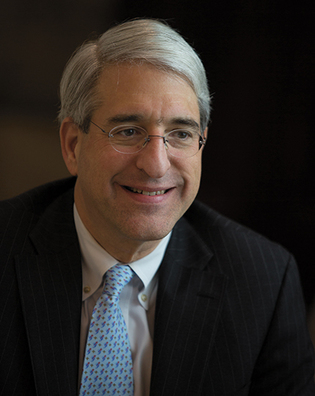 loading
loading
Q&A: Peter SaloveyWWI, Yale, and a tradition of serviceThe text on a Yale diploma confers “responsibilities,” not “privileges.” The Yale Alumni Magazine regularly holds a conversation with Yale president Peter Salovey ’86PhD to provide a forum in which alumni can learn his views. (Interviews are conducted both in person and by e-mail and condensed for print.)  Mark OstowView full imageY: On April 6, Yale marked America’s entrance into World War I in 1917. Many Yale men died in the war, including some who signed up long before the US did. The first was Arthur Bertram Randolph ’06, who died in September 1915. S: So many Yale students and graduates served their country in that war. The centennial gave us a moment to show our gratitude to those who served, particularly to those who sacrificed their lives. But it also provided us a chance to reflect on the tradition of service at Yale, so much a part of our DNA. It’s even in the presentation of our diplomas—Yale presidents don’t confer “rights and privileges,” as is typically the case, but “rights and responsibilities.” Any university or college would be proud of alumni who serve in some way—serve society, their country, or the cause of human welfare globally. But Yale expects service from its graduates. Our mission statement starts with the idea that Yale exists to improve the world now and in the future. We do that in part through encouraging service among our graduating students. Y: What do you consider the most important areas of service? S: It goes without saying that dying in the service of one’s country is the ultimate sacrifice. But there are numerous ways to serve the cause of bettering humanity—from military service, to other forms of government service, to teaching in an underserved part of the country or the world. It has to do with giving back, and sometimes with sacrificing short-term gratification for longer-term impact. Before Yale College graduates leave the campus, we ask them their plans, and it is impressive that their number-one occupational choice is teaching. And take Yale’s Jackson Institute for Global Affairs. Its teaching model relies both on traditional scholars and those in public service. Ambassador John Negroponte [’60], General Stanley McChrystal, and Secretary of State John Kerry [’66] are serving or have served in teaching roles there. What they can discuss with our students is of course the primary reason their presence in the classroom is so valuable. But also, they have led lives of admirable public service and even sacrifice. They exemplify values like gratitude and duty, which may sound old-fashioned until one meets the living exemplars. On the shelves outside my office is an enormous two-volume book called Yale in the World War. It lists everyone who served in World War I and includes memorial sketches of those who died. It contains a commencement address by John Proctor Clarke [Class of 1878] noting that, for 217 years, Yale had been training men for service “in church and civil state”—which is from Yale’s founding documents. The books were commissioned by Yale’s board of trustees. So, you don’t have to look hard to find evidence for the theme of service through the years. It’s one of the traditions that connects the Yale of today to the Yale of previous generations. Y: One question these issues raise is the cultural change toward military service, at Yale and across the US. A hundred years ago, just about everybody in Yale’s graduating class signed up. Now very few of us go into the military. Is this a problem? Is there anything Yale could or should do about this? S: The military is no longer a sampling of young men and women from across our country. Many of our students have grown up not knowing anyone who served. This is a loss, because it is through personal contact that one can be inspired, and those moments of inspiration can determine choices and directions students might take. That’s one of the reasons it was so important for ROTC to return to our campus. Many current Yale students have told me that until they came to Yale, and met a classmate in our Air Force or Naval ROTC programs, they had never known anyone in the US military. That would have been unimaginable in other eras. And we are making an effort to enroll more veterans at Yale College and in the graduate and professional schools. One example is the former guitar player and lead singer of our band, the Professors of Bluegrass. He was a Marine who came to Yale to complete a master’s degree in history and ultimately stayed for a PhD. He then returned to the Marines, where he has done intelligence work, teaching, and held other leadership positions. He is now, I believe, a lieutenant colonel. There can be a fluidity between military service and an education at Yale, and I’m proud of Yale’s role in his life.
The comment period has expired.
|
|